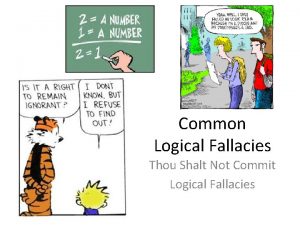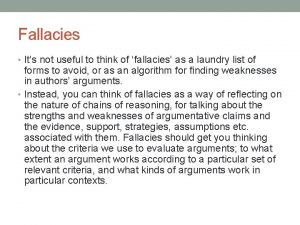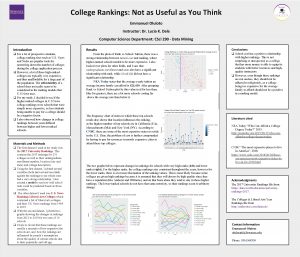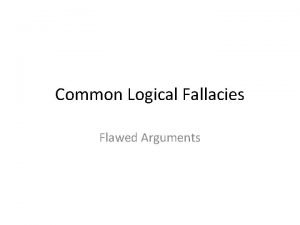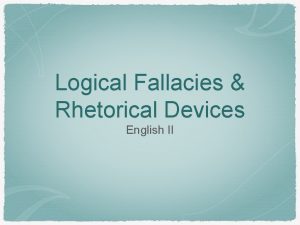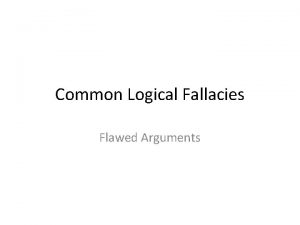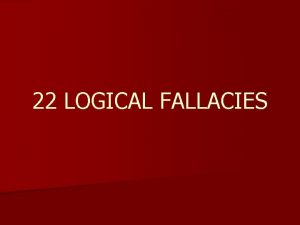Fallacies Its not useful to think of fallacies













- Slides: 13

Fallacies • It’s not useful to think of ‘fallacies’ as a laundry list of forms to avoid, or as an algorithm for finding weaknesses in authors’ arguments. • Instead, you can think of fallacies as a way of reflecting on the nature of chains of reasoning, for talking about the strengths and weaknesses of argumentative claims and the evidence, support, strategies, assumptions etc. associated with them. Fallacies should get you thinking about the criteria we use to evaluate arguments; to what extent an argument works according to a particular set of relevant criteria, and what kinds of arguments work in particular contexts.

Fallacies • Most fallacies are not strange or idiosyncratic forms of argument. Often they draw on perfectly valid and common forms of reasoning, but they do so in a way that is lacking in some respect. For example, sophisticated arguments often contain rebuttals and counterarguments that consider opposing views. If this is done well, it adds strength to an argument. However, if an author does not accurately represent an opponent’s argument, or presents a weak, caricatured version of that argument, we can say s/he has committed the fallacy of creating “a straw man. ” Obviously, fallacies are matters of degree and involve interpretation and argument – you have to make the case that evidence exists for the fallacy. Note that when considering whether an argument contains a fallacy, you must consider questions of audience, purpose and context. Reasoning that is weak or “fallacious” in one context may be persuasive and credible in another.

False Dilemma? • The False Dilemma or False Dichotomy Fallacy reduces a complex problem to two radically over-simplified choices, usually entirely good and one entirely bad. • Oversimplifying an issue by declaring that only two alternatives or ways of viewing the issue exist. Often one of these alternatives is clearly bad, so it is implied that there is only one reasonable position to take. Sometimes people criticize such an argumentative strategy by saying that it is “reductive” and “manipulative. ” • http: //southpark. cc. com/clips/151029/you-hate-children

Slippery Slope • Daily Show on Gay Marriage and Slippery Slope arguments (and http: //www. cc. com/video-clips/2 cx 97 r/the-daily-show-with-jon-stewart-lgbtq--s--t-just-got-realedition---slippery-sodomy-slope)

Loaded Question • A loaded question is a question which contains a controversial or unjustified assumption ( e. g. , a presumption of guilt). Such questions may be used as a rhetorical tool: the question attempts to limit replies to be those that serve the questioner's agenda (“answer yes or no!”) • The traditional example is the question "Have you stopped beating your wife? " Whether the respondent answers yes or no, he will admit to having a wife, and having beaten her at some time in the past. Thus, these facts are presupposed by the question which narrows the respondent to a single answer. • The fallacy relies upon context for its effect: the fact that a question presupposes something does not in itself make the question fallacious. Only when some of these presuppositions are not necessarily agreed to by the person who is asked the question does the argument containing them become fallacious. Hence the same question may be loaded in one context, but not in the other.

Loaded Question • Pretty activist outside Love Library stopping passersby with the question, “Do you want to stop world hunger? ” How do I say “no”? But if framed as, “do you want to give money to our organization today? ” it’s much easier to say no/walk by. • Isn’t is worth $10 a month to protect your home computer from hackers?

• The Daily Show on Rhetorical Questions that are clearly “loaded” (“Putting a question mark at the end of something, you can say **ing anything. ”) • http: //www. cc. com/video-clips/8 ov 5 kh/the-daily-show-with-jon-stewart-the-question-mark

Are these loaded questions? • “Is the press and political class here in Washington so consumed by fear and hatred of the NRA and America’s gun owners that you’re willing to accept a world where real resistance to evil monsters is a lone, unarmed school principal left to surrender her life to shield the children in her care? • “So why is the idea of a gun good when it's used to protect our president or our country or our police, but bad when it's used to protect our children in their schools? ”

Straw Man • The Daily Show, January 23, 2013 “Win, Lose or Straw” • http: //www. cc. com/video-clips/ino 7 ps/the-daily-show-with-jon-stewart-win--lose-or-straw

False analogy

Ad Hominem

Causal arguments and the “post hoc, ergo procter hoc” fallacy. • Post hoc and the West Wing https: //www. youtube. com/watch? v=HL_v. HDj. G 5 Wk&featur e=youtu. be • Friends & Joey’s fridge: https: //www. youtube. com/watch? v=0 ew. WFWQwl. Ts

• Demonization/scare tactics • http: //www. cc. com/video-clips/9 hryow/the-daily-show-with- jon-stewart-immigrant-disease
 Ramaniklal ambani
Ramaniklal ambani Its not easy but its worth it
Its not easy but its worth it Thou shalt not commit logical fallacies
Thou shalt not commit logical fallacies Sadlier unit 1 level d synonyms
Sadlier unit 1 level d synonyms Think said the robin
Think said the robin Think fam think
Think fam think The trees larkin
The trees larkin Forensic odontology would not be useful for _____.
Forensic odontology would not be useful for _____. Time to speak
Time to speak Argumentum verbo sum
Argumentum verbo sum How fortunate for leaders that men do not think
How fortunate for leaders that men do not think Data data everywhere and not a thought to think
Data data everywhere and not a thought to think The emigree poem analysis
The emigree poem analysis When a train increases its velocity its momentum
When a train increases its velocity its momentum


